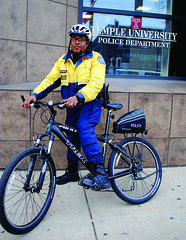An increase in alcohol-related incidents has caught the attention of the Board of Trustees’ Campus Life and Diversity Committee, as well as Campus Safety Services and the division of Student Affairs.
In a memo to Chief Financial Officer Anthony Wagner, Carl Bittenbender, executive director of CSS, reported that 28 students within CSS’s boundaries were arrested and cited for alcohol violations in September and October.
Another 74 were referred for disciplinary action, Wagner wrote.

Bittenbender added that those investigated for alcohol-related issues outside the CSS reporting area included 195 students who were cited for violations and 14 who were referred for judicial hearings.
In response to the increase, Bittenbender’s memo requested an estimated $10,000 per week to increase police patrolling on Thursday, Friday and Saturday nights. This figure is calculated from the amount of overtime hours for both Philadelphia and Temple police officers.
Bittenbender said possible reasons for this increase include an increase in student population and the rise of residential properties available to students west of Broad Street.
“I think a lot of it is attributed to the increase in students,” he said. “How much of it is an increase in their behavior of more drinking? Quite frankly, I don’t know.”
“But one thing is evident – community complaints from community residents has increased,” Bittenbender added.
In the memo to Wagner, Bittenbender reported that community complaints have risen 53 percent from 58 complaints in 2009, to 89 in 2010.
Stephanie Ives, the dean of students and associate vice president for Student Affairs, has been involved in drug and alcohol prevention since 1994. She said Temple is not unique in what it is experiencing.
“My colleagues at schools across the region are reporting similar experiences,” Ives said. “What puts Temple in a different category from some other schools is the level of responsiveness we’ve had.”
Ives said Student Affairs addresses high-risk alcohol behaviors through prevention – via alcohol awareness programs from the moment students register at Temple – and intervention through counseling and specific one-on-one skill-building education programs, such as Brief Alcohol Screening and Intervention for College Students. Enforcement of the Student Code of Conduct, is also another method of addressing the issue.
“The Code of Conduct does extend to off-campus behaviors, so if a student is committing some sort of a crime on 18th Street, for example, that student’s city citation can also be pursued through the Code of Conduct,” Ives said.
Ives said that Student Affairs is working with Temple Student Government and other student leaders to help enhance students’ rapport with the community.
“We want students to understand that there are real expectations of living in this community, that there are incredible opportunities and that this is a vibrant community to be a positive part of,” Ives said. “We’re trying to enhance those messages, and one example of doing that is the upcoming implementation of the ‘Good Neighbor’ policy.”
She added that through initiatives such as the “Good Neighbor” policy, the university will set expectations for students living in private housing nearby Main Campus to “feel the civic pride and watch out for our neighbors.”
TSG Student Body President Natalie Ramos-Castillo said it’s a matter of consideration for the community residents.
“We’re keeping 5-year-olds to 8-year-olds and some 90-year-olds up really late,” she said. “Do you think that’s fair to a 90-year-old? Did you appreciate that when you were 5 or 8?”
“We don’t want to arrest students,” Bittenbender said. “These incidents take away sources such as when our officers can patrol and concentrate efforts on criminal activities and not student activities.”
Josh Fernandez can be reached at josh@temple.edu.



Be the first to comment